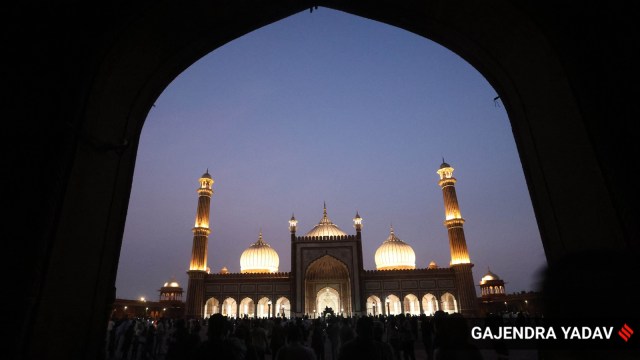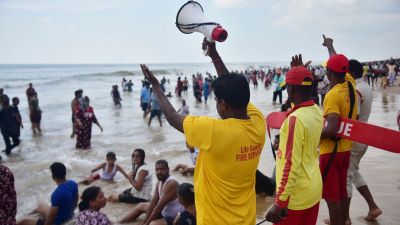📣 For more lifestyle news, click here to join our WhatsApp Channel and also follow us on Instagram
From self-reflection to empathy and charity: Significance of Ramadan and lessons it offers
At the end of Ramadan, Muslims celebrate Eid-ul-Fitr, the festival that marks the completion of the month of fasting.
 The sighting of the new moon marks the beginning of Ramadan. (Express Photo by Gajendra Yadav)
The sighting of the new moon marks the beginning of Ramadan. (Express Photo by Gajendra Yadav)The last ten days of Ramadan—the holiest ones during the month—are here, and Muslims across the world are preparing to make the most of them.
The term Ramadan comes from Arabic, while Ramzan is its Urdu equivalent. There is an ongoing debate in India about which term to use, but for consistency, we will use Ramadan.
Ramadan, the ninth month of the Islamic calendar, is one of the most sacred periods for Muslims. It is believed to be the month in which the Quran was revealed to Prophet Muhammad. To commemorate this divine revelation, people from the community (Ummah) fast for 29 or 30 days, engaging in acts of worship, self-discipline, and charity. The month is seen as an opportunity for spiritual growth, seeking forgiveness, and strengthening one’s faith in the Almighty.
Roza: Fasting during Ramadan
The sighting of the new moon marks the beginning of Ramadan. From then, all Muslims who have reached puberty are obligated to observe roza (fasting). From pre-dawn to sunset, they must abstain from eating, drinking, and sexual activity, for a period of 29 to 30 days.
The Urdu word roza originates from the Persian term roz, meaning “daily”. In Arabic, fasting is called sawm, meaning “to abstain”. It is one of the five pillars of Islam and is mandatory for all adult Muslims, except those who are ill, travelling, elderly, pregnant, nursing, or menstruating. Those unable to fast can compensate by fasting later or feeding a person in need for each missed day.
Roza-kushai: A child’s first fast
While children are not required to fast until puberty, they are often encouraged to practise fasting. Many families celebrate a child’s first full-day fast with a small gathering, new clothes, and gifts. This small yet significant ceremony, known as roza-kushai, marks an important step in a child’s spiritual journey.
Sehri: The pre-dawn meal
Fasting Muslims begin their day with sehri (or suhoor), a pre-dawn meal before the fajr (dawn) prayer. It is considered a commendable practice, helping individuals sustain energy throughout the day. In many cultures, people recite the Quran or pray after sehri, before continuing with their daily routines.
More than ‘just’ fasting
Fasting in Ramadan is not merely about abstaining from food and drink. A fasting person (rozedar) is encouraged to engage in prayer (namaz), Quranic recitation, acts of charity, and self-discipline.
The day’s fast ends with iftar (or iftari), a meal breaking the fast at sunset, traditionally begun with dates and sherbet (a sweet, chilled drink). This is followed by the maghrib (evening) prayer and an elaborate meal thereafter. Many communities organize extended iftar parties to bring people together, especially those away from family or in need.
Customs surrounding sehri and iftari vary—some cultures prefer a light pre-dawn meal and a grand feast in the evening, while others do the opposite.
Tarawih: Special Ramadan prayers
In addition to the five daily prayers, Muslims perform tarawih, a special congregational prayer held after isha (night prayer). During tarawih, the entire Quran is recited in mosques over the course of the month. Ramadan is also a time for communal gathering, and people invite each other for iftar and engage in acts of kindness.
Charity and empathy
There are three ways in which Muslims around the world engage in charitable acts. Sadaqah (charity), which gains significance during the month of Ramadan, is a voluntary practice, and can be observed in any form––donating food, clothes, or other necessary goods to the less fortunate. This differs from zakat, another pillar of Islam, which is a mandatory donation of 2.5 per cent of one’s wealth to those who need it the most. The third way is the Zakat al-Fitr, a compulsory charity given at the end of Ramadan to help the underprivileged celebrate Eid-ul-Fitr. These acts are a crucial lesson in empathy, and hold spiritual significance for the community.
Eid-ul-Fitr: The festival of breaking the fast
At the end of Ramadan, Muslims celebrate Eid-ul-Fitr, the festival that marks the completion of the month of fasting. This may fall on different days across the world, depending on the sighting of the moon. People congratulate each other on the occasion, visit the mosque, and participate in morning prayers with others, and savour traditional sweets like sewaiyaan (vermicelli dessert).
📣 For more lifestyle news, click here to join our WhatsApp Channel and also follow us on Instagram






- 01
- 02
- 03
- 04
- 05





















